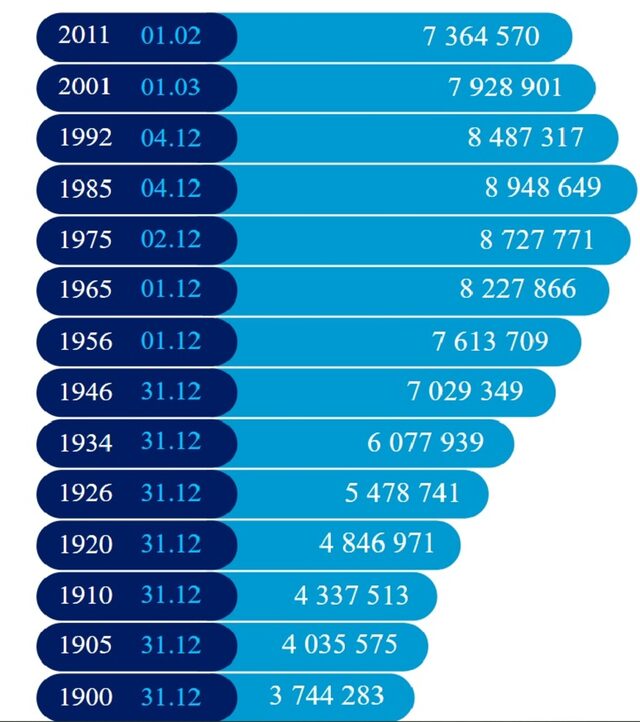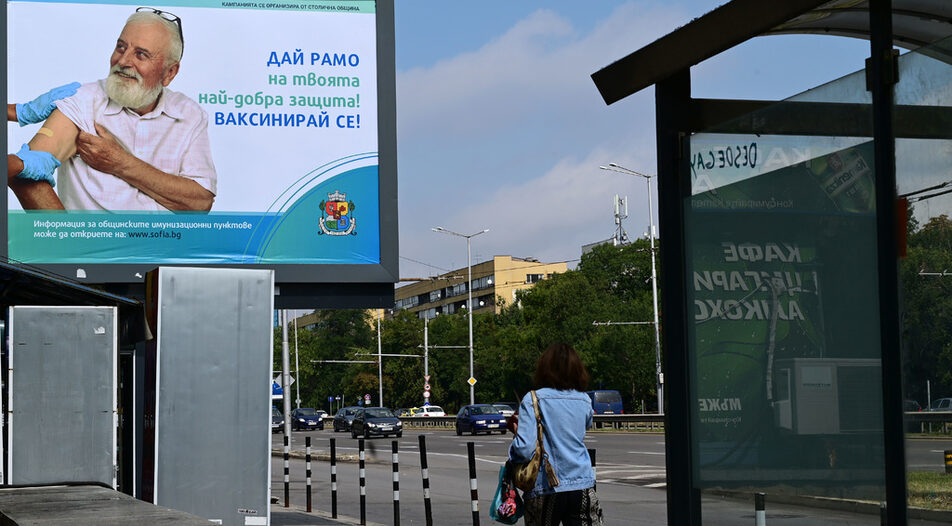This week we will talk about demographics - a touchy topic for Bulgarians but a favourite of politicians who love lamenting population collapse almost as much as arguing about contentious historical dates from 70+ years ago.
Despite it being a longstanding favorite topic for domestic and foreign journalists alike (The Economist famously published an article with the poignant headline If Hell is Other People, Bulgaria is Paradise a few years back), it remains much misunderstood, especially its implications for the present and the future of the nation.
I am telling you all this because a new explosion of dramatic headlines, fatalistic Facebook statuses and tragic declarations will likely ensue once the 2021 Census results become public at the end of the year.
We already see signs of the impending doom and gloom talk - politicians, commentators and social media users share the image below to illustrate the demographic change in the country. Taken from the Census website, people use it to make bold predictions about the end of the Bulgarian nation and/or the good old days of population growth until the bad, bad democracy emerged in 1989. This would, in turn, spur talk about demographic politics, stimulating births, increased social expenditure on mothers and children you name it.

This is not a bad thing per se. Definitely a lot can be done in support of motherhood. Unfortunately, the same people worrying about the unborn often show complete disregard for the living.
For instance, Bulgaria is conspicuously vacillating when it comes to Covid-19 vaccinations and "nationally-minded" politicians even purposefully put spokes in the wheel of immunisation for immediate political gains. One such example from last week is TISP's declaration (and proposed law) that posits how getting the Covid shot should always remain voluntary. As if there is any serious talk about compulsory vaccination in a country where fewer than 20 percent of the population have been jabbed!
That all happens as hundreds have been dying every week for the past month. As the death toll started rising - unlike in most other Western countries where mass vaccinations have brought down the death rates - the excuse of Covid-sceptics that "even people in the vaccinated countries are getting sick again" changed to "our nation was already sick and topped mortality rates before Covid".
A form of blissful nihilism, a nation-wide embrace of anti-scientific talk and disinformation has taken over the nation, as journalist Georgi Angelov put it in a comment for Deutsche Welle. The planned reopening of schools - without mass vaccinations of teachers, parents, and especially grandparents - will likely augur more deaths this autumn, as examples from unvaccinated US states already show. Many of these could have been avoided, if narrow-minded politicians of all complexions hadn't spoken out against vaccinations, or ignored the topic so as not to stir the antivax hornets' nest. In a few months, after the census is released, the very same people will be weeping over the end of Bulgaria, ignoring their own complicity in that process here and now through their opposition to vaccines.
1. Politics this week:
NSI, we have a problemSince we are on the topic of the 2021 Census - its start could hardly be described as trouble-free. Its online stage was launched on 7 September, but was immediately halted by what the National Statistics Institute (NSI) claimed to have been a hackers' attack. The website was inaccessible for a few hours and then it was relaunched only so that the first enthusiasts who logged in found out the system could not recognize their personal identification numbers (EGN in Bulgarian) or names.
Some of those who passed this hurdle then complained that entire neighborhoods - like the capital city's Iztok district - were missing from the residence option menu. And to top it all, a second hackers' attack hit the NSI servers on Thursday, bringing the Census2021 site down once again. In any case - keep on trying to log in, as the penalty for not doing so is 80 euro.
Pensions debacle
In Parliament, the likely last week for MPs was mostly filled with debates about the revision of the state budget and the increase of old age pensions. It all seemed to be working smoothly last week, when the Budget Commission passed an overall increase of pensions by 12.5 percent from October.
But when debates moved before cameras in the General Assembly, all agreements were forgotten and every previous commitment - abandoned. A populist race to add a 40, 50, 60 euro supplement in addition to the general increase of pensions emanated from BSP, MRF and GERB, who previously backed caretaker Finance Minister Assen Vassilev's proposals in the commission. Mr Vassilev himself warned that such a double increase might "blow up" the state coffers.
In the end, a form of a reasonable compromise was struck, with MPs approving a 60 euro bonus to all pensions for the last three months of the year, followed by an overall increase from the start of 2022.
Read more on the political shenanigans in the country in our article from Thursday.
Yet another election - this time, for Football union president
If you think there have not been enough elections this year, another looms on 12 October - for the presidency of the Bulgarian Football Union (BFU). The announcement came after a ruling of the Sofia City Court settled that 191 clubs - or more than one third of all professional teams in the country - want the resignation of Borislav Mihailov, the current BFU boss. The initiative to topple Mr Mihailov came from football legend and former Manchester United player Dimitar Berbatov, who has been battling the perceived corrupt and inept management of Bulgarian professional football. Mr Berbatov announced his bid to take over and modernize BFU a few months ago. Let's see if he can see his war against the entrenched interests in the union through until the end.
Protests and boycotts of restaurant workers
Thousands of employees of bars and restaurants took to the streets of Sofia during the week to protest against the measures placed on the businesses they work for in an attempt to curb the spread of Covid-19. Many employees and employers' associations alike refuse to follow the restrictions imposed on them from 7 September by the caretaker health authorities.
2. Economics:
Caretaker gov't sells its first T-bondsOn Thursday, the Ministry of Finance announced it has sold 102.3 mln euro of internal debt in government bonds to investors. The 5-year Treasury bonds were placed at a negative weighted average annual yield of 0.15 percent according to Bulgaria National Bank (BNB) data. The issue of 5-year bonds has already been offered to investors twice this year, achieving negative yields in February and March, although it was initially -0.17 percent and then -0.1 percent. This is the first debt issuance during the term of caretaker Minister of Finance Assen Vassilev.
Increasing concession taxes?
Talking about Mr Vassilev, on Friday last week he mulled a potential increase of concession taxes to offset lower VAT payments to the budget. During a hearing in the Budget Commission in Parliament, he said that the Energy and Tourism ministries are already considering increasing the payments they expect to receive from private businesses operating state resources such as mining and beaches for profit.
He cited the example of Dundee Precious Metals, a Canadian-Bulgarian gold mining business operating in Chelopech, which he said pays only $26 million to the state, while digging gold worth $740 million. The president of the Budget Commission, Lyubomir Karimanski (TISP) backed Mr Vassilev's demand. Such a move might cause controversy, as there is an effective concession agreement with Dundee Precious Metals until 2029.
Record-high GDP growth for second quarter of 2021
On Tuesday NSI published its revised data on Bulgaria's GDP growth for the second quarter of 2021 and it stands at a record-breaking 9.9 percent as compared to the same period in 2020.This is a 0.6 percent increase compared to the first quarter of the year and is primarily driven by the services sector, exports and individual consumption. This is the highest rate of annual quarter to quarter GDP growth in Bulgaria's post-socialist history.
3. Business:
Retail IKEAThe Swedish furniture company has opened a second store in Sofia. The fifth IKEA shop in Bulgaria overall is located within the Mall of Sofia on Stamboliiski Boulevard. The company grew its business in Bulgaria by 11 percent in 2020 and now controls one tenth of the furniture market.
Deliveries
GlovoOn Thursday, the Spanish group announced it has purchased the Bulgarian business of Foodpanda. All 2,000 restaurants and other partners of Foodpanda, including supermarket chains Kaufland, Fantastico and DM, will now be part of the Glovo deliveries system.
Online payment
Google PayThe online giant's payment application would now be available in the country with all its functionalities and can be downloaded from the Google Play Store, the company announced on Thursday.

4. Energy:
Price of natural gas reaches 50 euro per MwhAfter some fluctuations in mid-August, the price of natural gas traded on European stock exchanges went up again. The leading gas sales hub of Europe, TTF, registered a new record of 51.37 euro per Mwh. For comparison, on 20 August the price of gas at the hub was 39.76 euro per Mwh, which indicates a 29 percent growth over just two weeks. Against this background, the regulated price of natural gas in Bulgaria, which has been set by the Energy and Water Regulatory Commission on 1 September, is 35.5 euro per Mwh - significantly lower than the European prices, despite a 20.5 increase compared to August.
Watch out for:
Person:
Rumen RadevThe President will have to decide on the date of the next early elections at some point next week. He consulted the Central Electoral Commission on Wednesday and the experts said they prefer a "2 in 1 election" on 14 or 21 November. Alternatively, they told Mr Radev, they would need two weeks to adapt all voting machines for the Presidential vote, which would mean Parliamentary elections on 31 October at the latest.
Date:
14 SeptemberThe temporary Parliamentary commission that aims to investigate how the illegal mansion of MRF honorary leader Ahmed Dogan was constructed invited him to personally testify before it on this day. That is, if Mr Radev hasn't dissolved Parliament by then.
Places:
Metro supermarkets
The chain is offering 10 euro gift vouchers to people who get a Covid-19 jab in the newly opened vaccination points in the supermarket's outlets in Sofia, Plovdiv, Varna, Burgas and Veliko Tarnovo. The voucher can be used for food purchases or as a donation for the BCause foundation initiative to support children of doctors and teachers who lost their lives to the infection.This week's word has been used by GERB leader Boyko Borissov to describe President Rumen Radev for the last couple of years. It is a crude attempt at wordplay by the former Prime Minister, as the Constitution describes the Head of State as the person who "embodies the unity of the nation," and Mr Borissov wants to convince the general public that Mr Radev is failing in this primary task by disuniting the people. His latest usage of the word "Razedinitel", however, is naked in its cynicism, as he used it in a clearly partisan 40-minute rant on 6 September, Bulgaria's Unification day.
This week we will talk about demographics - a touchy topic for Bulgarians but a favourite of politicians who love lamenting population collapse almost as much as arguing about contentious historical dates from 70+ years ago.
Despite it being a longstanding favorite topic for domestic and foreign journalists alike (The Economist famously published an article with the poignant headline If Hell is Other People, Bulgaria is Paradise a few years back), it remains much misunderstood, especially its implications for the present and the future of the nation.












